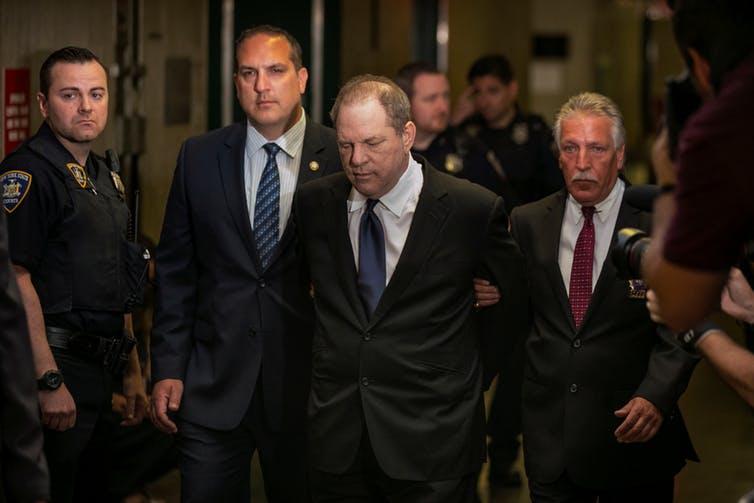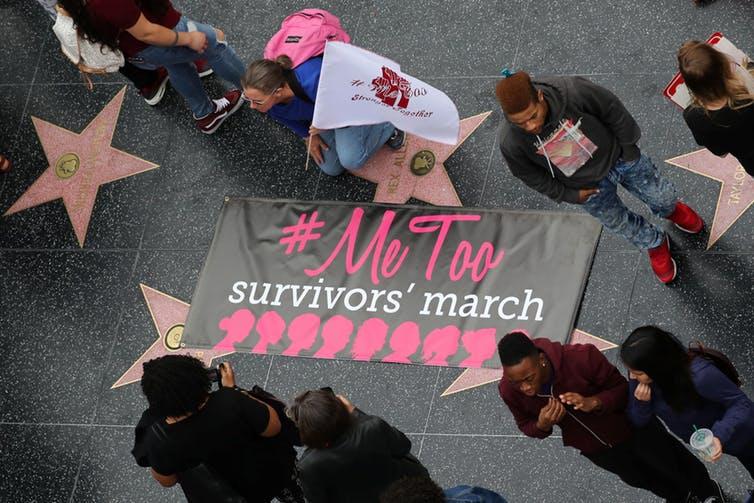#MeToo movement finds an unlikely champion in Wall Street with the new ‘Weinstein clause’
A statue of a girl facing the Wall St. Bull is seen, as part of a campaign by US fund manager State Street to push companies to put women on their boards, in the financial district in New York, March 7, 2017.
If you were worried that the #MeToo movement might fade away, fear not. It has been carved into one of the most immovable objects in human history.
Legal boilerplate.
And not just any boilerplate. But the language in giant merger agreements, used when one company is buying out another company.
Basically, corporate lawyers have been adding a sentence that forces companies to disclose allegations of sexual harassment. On Wall Street, it has come to be known as the “Weinstein clause.”
That’s new. In my years as an employment lawyer, I worked on more than 50 corporate acquisitions. The work somehow managed to be both boring and stressful, as I rapidly sifted through masses of personnel documents to figure out what needed to be disclosed.
Although it was common to disclose ongoing lawsuits or threats of litigation, “allegations” or even internal complaints of harassment were not on anyone’s radar.
The arrival of the Weinstein clause signals how important #MeToo has become — not just as a social movement but as a business risk.

When employment law was small potatoes
The “Weinstein clause” appears in a section of the agreement called the “representations and warranties,” where the seller attests that it has complied with certain laws or denies certain liabilities.
For example, the agreement might say that there are no ongoing lawsuits against the company. If that statement is untrue because the company is litigating a discrimination case in federal court, then the company needs to list the name of the case in a huge side document called a “disclosure schedule.”
Previously, employment-related stuff, like harassment or discrimination, was considered small potatoes in a corporate acquisition. These cases are usually not worth more than US$100,000 or $200,000, which is practically a rounding error when you’re talking about a merger worth hundreds of millions or even billions of dollars.
So in large mergers, the representations and warranties tend to only call for the disclosure of big ticket liabilities. A disclosure schedule in those deals is like the All-Star Team of massive liabilities. It’s where “We don’t own any of our intellectual property” goes to hang out with “We bribed foreign government officials” and “Our only liquid assets are fidget spinners.”
As an employment lawyer on a large deal, I was essentially a benchwarmer. I was pumped if I got a lawsuit or two added to the disclosure schedule — that was my two minutes of playing time.
A mere harassment allegation? Please. That wouldn’t even make it into the memo I prepared that no one would read.
The advent of the Weinstein clause
But sometime around March of this year, lawyers started adding so-called “Weinstein clauses” to their merger agreements.
For example, in a $4.9 billion deal in June to acquire health care analytics company, Cotiviti, the merger agreement called for the disclosure of any “allegations of sexual harassment” against officers, directors or employees who supervise at least eight other employees if it would result in a “material adverse event.”
The term “material adverse event” means “so bad that it would noticeably affect our profits, keeping in mind that we’re worth 4.9 billion dollars.”
The inclusion of this language is remarkable because it assumes that an allegation of harassment might actually turn out to be more than a blip on the radar of a big company.
That would have been unthinkable a year ago. And yet now is firmly within the realm of the plausible after Harvey Weinstein’s $200 million entertainment company went bankrupt and shareholders of Wynn Resorts lost $3.5 billion in value in the wake of harassment scandals.
Other mergers compel similar disclosures, regardless of whether the allegations are “material.” In some cases, they ask about allegations against high-level employees going back five, eight or 10 years.
That’s way past the statute of limitations. In other words, we’re not talking about legal risks any more. This is about the seismic risk of a brand tainted by misconduct.

A new normal for compliance
The arrival of the Weinstein clause may seem inconsequential, but it signals recognition that harassment qualifies as a massive liability. And massive liabilities command attention and resources before a merger is even in the cards.
In a business environment where initial public offerings are few and far between, a merger may be the best way for early investors to profit. Investors and venture capitalists will now care a lot more about how companies handle their harassment complaints, because it affects their ability to cash out. These players will then put pressure on startups and other fast-growing companies to clean up their acts.
![]() That’s the best performance I’ve seen from boilerplate in a long time.
That’s the best performance I’ve seen from boilerplate in a long time.
Elizabeth C. Tippett, Associate Professor, School of Law, University of Oregon
This article was originally published on The Conversation. Read the original article.
Our coverage reaches millions each week, but only a small fraction of listeners contribute to sustain our program. We still need 224 more people to donate $100 or $10/monthly to unlock our $67,000 match. Will you help us get there today?
